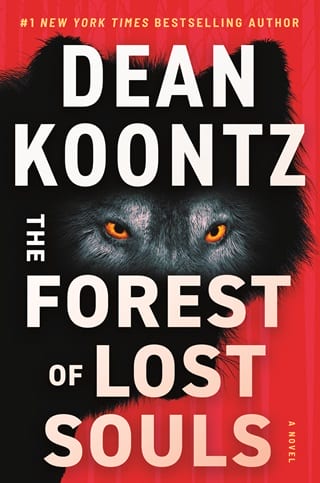16 BLACKBERRIES
16
BLACKBERRIES
She first sees Lupo the previous September, almost three months after José Nochelobo's death.
Because grief is blacker when she's inactive, Vida stays busy to dull the claws of anguish that lacerate her, exhausting herself by day's end in order that she can sleep. On this fateful afternoon, she hikes much farther than she needs to go, to the most distant place where she knows that wild blackberries might be found. She carries a picnic cooler lined with brown paper.
She reaches a ridge where the trees thin out. Past the crest, the land slopes in a long meadow where wild grass has been cropped by bighorn sheep. In the past, she stood here to watch them grazing, either rams or ewes, never males and females at the same time, for they live apart except when they mate in November and December.
They are always alert for bears, wolves, coyotes, and mountain lions. They shy away from people. At the sight of Ogden, they had always galloped, nimble and sure-footed, off the pasture and up a nearby rocky escarpment where few if any predators could follow.
At the moment, no sheep are present because ten wolves have claimed the meadow. Vida has never seen a pack this large before. Six appear to be newborns from the spring, still young enough to stalk one another and tumble about in games that serve as practice for the hunts they will one day join. In fact, sometime in winter, fully grown, some will split off to go exploring and form a pack or packs of their own.
The scent and sight of Vida bring their focus to her, but they study her for less than a minute before they return to their leisure or their play. Had she been Ogden or perhaps anyone else, they would have casually retreated from open ground and into the trees, with an air of prudence rather than fear.
The most interesting individual in the pack is obviously its leader, whom she decides on the spot to name Lupo. He is big, more than two feet tall at the withers, surely five and a half feet from point of shoulder to point of butt. He must weigh a hundred eighty pounds or more. She knows he is the leader because he holds his head higher than the others do, and his tail is straight up whenever he observes her.
Aside from his great beauty, the most interesting thing about Lupo is that he is apparently half wolf, half German shepherd, yet occupies the highest position of respect, which makes him something of a mystery if not a miracle. The others are typical gray wolves, with coats of gray, white, black, and brown hairs. Lupo's coat has some gray, a little white, but is mostly black and wheat gold. His broad skull and wedge-shaped muzzle are of equal length, so his face is less pointed than those of the others; his ears are set higher and are more erect than his pack mates' ears.
The wild loops of fruited brambles continue for about a hundred yards along the high end of the meadow, often fully exposed but also tangled through flourishing goat's beard and fireweed and grass. In addition to large game like deer and bighorn sheep, wolves eat small mammals, birds, fish, snakes, frogs, insects—and fruit. Armed with many thorns, these berried vines defend against most creatures of the wild, and even birds harvest less because the plants do not offer a sturdy perch. Therefore, the berries are fat and ripe and plentiful.
Vida's intention is to pile the fruit on the paper lining in the cooler; instead, she removes the paper and sets it aside. Having pulled on nitrile gloves to guard against purple fingers, she fills the eight-quart cooler. As she carries the container and paper into the meadow, the wolves fall still and intently watch her.
Although she knew why she took the lining from the cooler, she is nonetheless mildly surprised when she puts the brown paper on the ground and pours the berries onto it. She returns to the vines and kneels there and watches the wolves.
Lupo is the first to approach the offering. His black nose works its many muscles. He lifts his head and stares at her. His eyes are bright with intelligence. He smells the berries again and then eats a portion of them. As if by psychic invitation from their leader, the younger wolves come forward two at a time, and after them the elders. They have no knowledge of math other than whatever sense of proportionality instinct provides them, yet each takes what seems to be a fair share, as though there is a respected pack rule against gluttony at the expense of others.
As Vida watches them, she can't easily formulate a satisfying explanation of why she has given them this bounty. Eventually she decides, I do this for you because I am powerless to do anything for my lost parents, my uncle, or José Nochelobo. That is true, but it is not the full truth, which will be revealed to her only in time.
 Fullepub
Fullepub 



